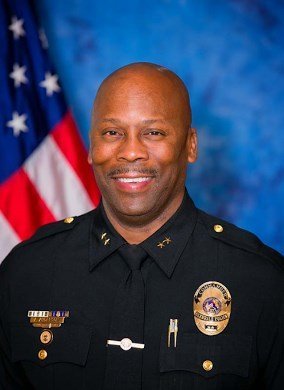Andre Anderson says his main task will be to restore trust between Ferguson’s predominantly black populace and the Missouri city’s mostly white police force.
Anderson, the city’s first African-American head of police, believes he’s the right man for the job.
Ferguson officials on Wednesday introduced Anderson as the city’s latest interim police chief. He will take at least a six-month leave of absence from his commander post with police in Glendale, Arizona, to tackle a department put in the national spotlight by last August’s shooting of teenager Michael Brown.
Anderson told reporters his first priority would be “simply to build trust” and enhance the city’s recent efforts to get officers to develop positive relationships with people in the areas they patrol.
That “simple answer to a sometimes complicated situation,” Anderson said, is not something the force can do on its own, and he asked for the community’s help as he leads.
“We cannot do this without you,” he said, addressing residents. “I believe that together, we can forge better relationships.”
Also on his agenda: Training his officers to guard against bias and escalation, and hiring more qualified, black officers.
Anderson’s appointment comes four months after the U.S. Justice Department released a report saying it found a “pattern and practice” of discrimination against African-Americans by Ferguson police and municipal courts.
The police chief at the time, Thomas Jackson, resigned, making way for Al Eickhoff to take over as interim chief.
Anderson, hired by a new city manager who also had worked in Glendale, succeeds Eickhoff, who will stay with the department in a role that hasn’t been announced.
The Department of Justice report had found that Ferguson’s officers saw residents as “sources of revenue,” a practice that federal investigators said disproportionately targeted African-Americans.
The report also found evidence of racist jokes sent by Ferguson police and court officials. Ferguson is a city of 21,000 that is 67% African-American.
The Justice Department launched its investigation after a white Ferguson police officer, Darren Wilson, shot and killed Brown, a black teenager, in August, setting off months of sometimes violent street protests in the St. Louis suburb.
Both a grand jury and the Justice Department declined to bring charges against Wilson, who said he shot Brown in self-defense. Wilson left the force after the shooting.
Anderson said he hopes he will be a candidate to take over the department full-time. But he said his focus will be working on community policing in the six-month interim window that he has.
A reporter asked Anderson whether he, as a newcomer to the St. Louis suburb, could understand the community enough to be effective.
He said the area where he grew up, southwest Philadelphia, had demographics similar to Ferguson’s, and he had seen some of the same police-community trust issues. He said 16 of his 24 years in law enforcement have been in a leadership role.
“There’s a lot of work to be done. I’m ready to roll up my sleeves and get to work,” he said.



